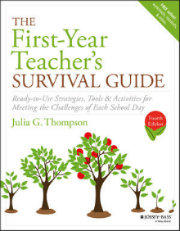Quick Tips for New T’s – Managing Your Time
Just landed your first teaching job? Read these tips now (in slow time) from master teacher Julia G. Thompson, bestselling author of The First-Year Teacher’s Survival Guide (4th Edition). And as you further prepare over the summer, check out her other MiddleWeb articles for newbies. Fast time is coming soon!
When I asked 19-year teaching veteran Jessica Statz about her biggest surprise when she began teaching, here’s what she told me:
I think what surprised me the most as a new teacher was trying to manage my time. I am very good at time management and thought it would be a piece of cake. I was wrong.
I felt prepared to teach my subject, but once the real work began to happen, I had to figure out a way to still go on walks, watch TV, and hang out with friends. It took time, but I was able to prioritize life and work.
If you are a beginning teacher, wondering about time, I’ve created a collection of quick tips that can help you maximize your precious minutes and hours at school, minimize the time you spend working at home, and keep from sabotaging your own strategies. These are not solutions for understaffed, under-resourced, overcrowded schools. Think of them as part of a personal peak skill set.
Quick Tips for Maximizing the Time You Have at School
Learning to use the time that you have available to you while you are at school will not only make your school day easier and more pleasant but also salvage your personal life. How? Being productive at school will reduce the amount of work that you have to accomplish at home.
Some of these tips may seem obvious; others may seem unnecessary. Every teacher is different, but know that these practices are fire-tested!
- When you have complicated tasks to do, divide them into smaller pieces with specific deadlines for each one.
- Write yourself reminders. Teachers have too much to do to keep everything straight without reminders. Set reminders on your phone or send yourself reminder e-mails or texts when you have important deadlines if handwritten ones don’t work as well for you.
- If a task will take less than three minutes, do it right away.
Use either a digital or paper calendar as a planner. Record tasks, appointments, and other information you’ll need to remember as you plan your workdays. Don’t just plan for the day but also for the week, for the month, for the semester, and for the year.
- Refuse politely when someone asks you to give time you cannot spare.
- Follow the old business rule: touch each sheet of paper only once.
- Keep your keys and your badge (if your district has issued you one) in the same location each day.
- Deal efficiently with mail. Act immediately on items that require a written response. Throw away or recycle junk mail. File catalogs for later use.
- Set up equipment early in case there are problems.
- Don’t arrive too early or too late to meetings or duty assignments.
- Delegate as much as you can. Even very young students can accomplish many routine tasks, such as putting up posters or keeping the supply area clean.
- Have an up-to-date set of emergency lesson plans ready—just in case.
Further, you should learn to use small blocks of time wisely. You will be surprised at how much you can accomplish in a short amount of time if you stay focused.
In fifteen minutes, you can…
- Grade the objective portion of a set of test papers
- Update your class web page or blog
- Create a review sheet
- Answer e-mail
- Create warm-up exercises for the entire week
In ten minutes, you can…
Call students’ parents or guardians
- Write a lesson plan
- Grade some essay questions
- Average grades and post them
- Check homework papers
In five minutes, you can…
- Create a dynamic closing exercise
- Write a positive comment on at least five papers
- Review key points in a lesson with a brief multimedia presentation
- Write a positive note and send it home with a student
In three minutes, you can…
- Record grades
- Drill your students with PowerPoint games
- Put stickers on a set of papers
- Praise a class for good behavior
- Have students write an evaluation of the day’s lesson
In one minute, you can…
- Erase the board
- Display an image related to the day’s lesson
- Have students tidy the room
- Recognize the student of the day or week
- Write an inspirational message on the board
- Use the hole punch on a set of papers
How Teachers Sabotage Their Time Management Strategies
Although there are far more tasks to be done than any teacher can ever manage to complete in a school day, if you just look around your building, you will find that there are excellent teachers who are so well prepared that they seem to radiate a calm energy.

Here is a quick list of some of the most common mistakes that can cause wasted time at work:
- Falling behind in grading, planning, and other predictable routine paperwork chores
- Attempting to cram instead of dividing a project into smaller, more manageable parts and doing each one systematically
- Trying to do everything yourself instead of asking for help or delegating tasks
- Neglecting to plan and prioritize your work
- Giving in to distractions when researching or working online
- Spending planning period time chatting with colleagues instead of accomplishing necessary tasks
- Being distracted by classroom concerns and other problems instead of resolving them
- Disregarding the importance of using a planner, a calendar, or other scheduling strategies
- Ignoring small problems until they become more difficult to resolve
- Checking e-mail all day long instead of at planned times
- Declining to use reminders, such as a to-do list or digital notifications
How to Minimize the Time You Spend Working at Home
In addition to the general increase in productivity that can result from sound time management strategies, there are four actions that you can take right away to lessen the amount of time that you spend doing schoolwork at home:
Action One: Focus at school. Think of every minute at school as usable work time. Even five-minute blocks of time while you are waiting for a meeting to begin, for example, can be productive if you choose. Try your best to do schoolwork at school instead of at home. There are many apps designed to help you stay focused during the day. A user-friendly app that you may want to explore is Focus Booster (https://www.focusboosterapp.com/). This app allows users to focus for twenty-five minutes at a time and then take a five-minute break. It is particularly useful for boosting planning period productivity.
Action Two: Don’t take all your papers home each day. Just take home a manageable number—only what you can grade in one hour, for instance. At home, set a timer and stop when the time you have planned for working is over. Dragging home so much work that you can’t possibly complete it all will only distress you.

Action Four: Set aside time for relaxation, no matter how much school work you have to do. There is no virtue in allowing school work to consume an entire weekend. Plan when you are going to do some work and plan for when you are going to take time to just be yourself.
Read Julia’s companion article about time management
Read a review of the First Year Teacher’s Survival Guide
Julia G. Thompson, who received her BA in English from Virginia Tech, recently retired after forty years as a classroom teacher in the public schools of Virginia, Arizona, and North Carolina. She continues to focus her advice on the practical aspects of a teacher’s busy professional life.

Images: Phillip Martin

































